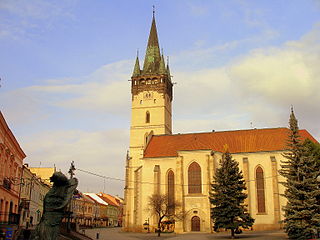Sola scriptura, meaning by scripture alone, is a Christian theological doctrine held by most Protestant Christian denominations, in particular the Lutheran and Reformed traditions of Protestantism, that posits the Bible as the sole infallible source of authority for Christian faith and practice. The Catholic Church considers it heterodox and generally the Orthodox churches consider it to be contrary to the 'phronema' of the Church.

Reformation Day is a Protestant Christian religious holiday celebrated on 31 October, alongside All Hallows' Eve (Halloween) during the triduum of Allhallowtide, in remembrance of the onset of the Reformation.
The Brethren of the Common Life was a Roman Catholic pietist religious community founded in the Netherlands in the 14th century by Gerard Groote, formerly a successful and worldly educator who had had a religious experience and preached a life of simple devotion to Jesus Christ. Without taking up irrevocable vows, the Brethren banded together in communities, giving up their worldly goods to live chaste and strictly regulated lives in common houses, devoting every waking hour to attending divine service, reading and preaching of sermons, labouring productively, and taking meals in common that were accompanied by the reading aloud of Scripture: "judged from the ascetic discipline and intention of this life, it had few features which distinguished it from life in a monastery", observes Hans Baron.

Nicholas of Lyra, or Nicolaus Lyranus, a Franciscan teacher, was among the most influential practitioners of biblical exegesis in the Middle Ages. Little is known about his youth, aside from the fact of his birth, around 1270, in Lyre, Normandy.

Jaroslav Jan Pelikan Jr. was an American scholar of the history of Christianity, Christian theology, and medieval intellectual history at Yale University.
Protestantism originated from the Protestant Reformation of the 16th century. The term Protestant comes from the Protestation at Speyer in 1529, where the nobility protested against enforcement of the Edict of Worms which subjected advocates of Lutheranism to forfeit of all their property. However, the theological underpinnings go back much further, as Protestant theologians of the time cited both Church Fathers and the Apostles to justify their choices and formulations. The earliest origin of Protestantism is controversial; with some Protestants today claiming origin back to people in the early church deemed heretical such as Jovinian and Vigilantius.

The term Evangelical Catholic is used in Lutheranism, alongside the term Augsburg Catholic, with those calling themselves Evangelical Catholic Lutherans or Lutherans of Evangelical Catholic churchmanship stressing the catholicity of historic Lutheranism in liturgy, beliefs, practices, and doctrines. Evangelical Catholics teach that Lutheranism at its core "is deeply and fundamentally catholic". The majority of Evangelical Catholic Lutheran clergy and parishes are members of mainstream Lutheran denominations.

Lutheranism as a religious movement originated in the early 16th century Holy Roman Empire as an attempt to reform the Roman Catholic Church. The movement originated with the call for a public debate regarding several issues within the Catholic Church by Martin Luther, then a professor of Bible at the young University of Wittenberg. Lutheranism soon became a wider religious and political movement within the Holy Roman Empire owing to support from key electors and the widespread adoption of the printing press. This movement soon spread throughout northern Europe and became the driving force behind the wider Protestant Reformation. Today, Lutheranism has spread from Europe to all six populated continents.

Charles Porterfield Krauth was a pastor, theologian and educator in the Lutheran branch of Christianity. He is a leading figure in the revival of the Lutheran Confessions connected to Neo-Lutheranism in the United States.
This is a selected list of works by and about Martin Luther, the German theologian. The emphasis is on English language materials.
Robert Kolb is professor emeritus of Systematic Theology at Concordia Seminary, St. Louis, Missouri, and a world-renowned authority on Martin Luther and the history of the Reformation.

Eric W. Gritsch was an American Lutheran ecumenical theologian and Luther scholar.

In 16th-century Christianity, Protestantism came to the forefront and marked a significant change in the Christian world.

Lutheranism is one of the largest branches of Protestantism, identifying primarily with the theology of Martin Luther, the 16th-century German monk and reformer whose efforts to reform the theology and practice of the Catholic Church launched the Protestant Reformation. The reaction of the government and church authorities to the international spread of his writings, beginning with the Ninety-five Theses, divided Western Christianity. During the Reformation, Lutheranism became the state religion of numerous states of northern Europe, especially in northern Germany, Scandinavia and the then-Livonian Order. Lutheran clergy became civil servants and the Lutheran churches became part of the state.

Protestantism is a branch of Christianity that follows the theological tenets of the Protestant Reformation, a movement that began seeking to reform the Catholic Church from within in the 16th century against what its followers perceived to be errors, abuses, and discrepancies within it.
David Curtis Steinmetz was an American historian of late medieval and early modern Christianity.
Theodore N. Swanson, an ordained Pastor of the Evangelical Lutheran Church in America is an Old Testament Scholar. Swanson taught Old Testament at the United Theological College, Bangalore, India.

Proto-Protestantism, also called pre-Protestantism, refers to individuals and movements that propagated ideas similar to Protestantism before 1517, which historians usually regard as the starting year for the Reformation era. The relationship between medieval sects and Protestantism is an issue that has been debated by historians.
Church music during the Reformation developed during the Protestant Reformation in two schools of thought, the regulative and normative principles of worship, based on reformers John Calvin and Martin Luther. They derived their concepts in response to the Catholic church music, which they found distracting and too ornate. Both principles also pursued use of the native tongue, either alongside or in place of liturgical Latin.

Catholic–Protestant relations refers to the social, political and theological relations and dialogue between the Catholics and Protestants.











